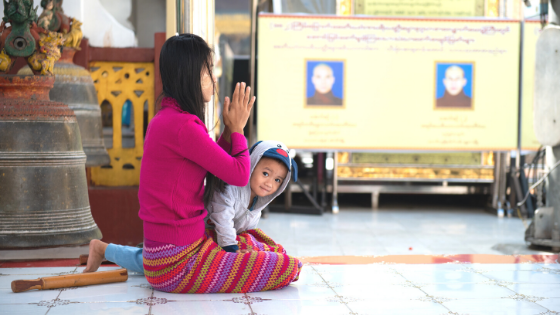by Katie Archibald-Woodward, multimedia storyteller + ministry friend
Frontier Fellowship’s staff, along with a board member and some family members, traveled to Thailand and Myanmar in January to discover together how the Good News of Jesus is being made known to people groups in this part of the Buddhist world. Here, multimedia storyteller and ministry friend Katie Archibald-Woodward shares insights from our team about what it means to engage and love an unfamiliar culture.
In this time of uncertainty, social distancing, quarantine and grounding of flights, I find myself recalling travel through memories, photos and stories with even greater appreciation. They help me feel connected. They remind me we are connected and that our loving, provisional God is holding us all and constantly working good in His beloved world.
As I reflect on our trip to Thailand and Myanmar, I’m all the more aware of the blessing it was to travel with others. When we travel in community we experience a place, its people and God more robustly than we could on our own. Here is a taste of what our collective eyes, ears and hearts gathered in Southeast Asia.
“It’s so different than anywhere else I’ve been,” reflected Associate Director Denise Sciuto early in the trip. We all noticed it—in the architecture, landscape, food and people. They were all quite distinct from our experiences of similar things in cities across the US. Both Thailand and Myanmar bore bright-colored buildings with turned up roof corners, jungle foliage and—as we discovered in Myanmar—many men and women wearing a longyi (sheet of cloth) around their torsos, their faces painted with thanaka, a traditional yellow paste.
The more we spent time in the two regions, the more complex our experiences became. “One thing that continues to impress me,” Mission Advocate Nancy Von Schimmelmann shared, “is how, regardless of our cultural backgrounds, we all enjoy taking our children to the park, getting together to eat or laughing with friends, even though the foods we eat, the games we play and the languages we speak are so different.”
It is vital we notice and name our observations, the similarities and the differences, the comforts and discomforts. These help us stay connected to ourselves in unfamiliar environments and be open to how God desires to meet and care for us in these new frontiers—physically, spiritually and emotionally. These factors are what church planters and mobilizers must be acutely aware of and they are equally helpful for us in the uncharted territories of our times.
As Nancy’s husband, Mission Advocate Bob Von Schimmelmann, pointed out, “Everywhere is a possible place for ministry. All times and all places.” What might be those places for us now? Especially at this time when anxiety and fear, particularly of the unknown, are high, and where God’s peace that surpasses all understanding is needed more than ever?
Perhaps the insightful posits of Associate Director Taliilee Fiqruu and Light of Hope Ministry Ethiopia Director Urgessa Biru can shed some light on this front. “How can I share the Good News of Jesus if I don’t let myself experience the local culture?” proposes Taliilee. How are our local cultures doing right now? What are their needs? “Sharing Christ,” Urgessa says, “starts with love and understanding the people.”
What are ways we can love and offer understanding to each other in these new social “frontiers” at home?
Read more about Frontier Fellowship’s vision trip to Southeast Asia in the spring issue of The Frontier Journal.


Comments are closed.